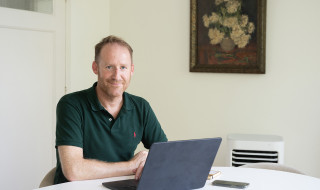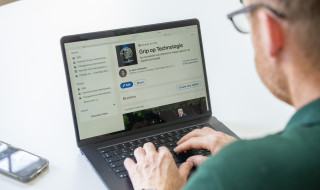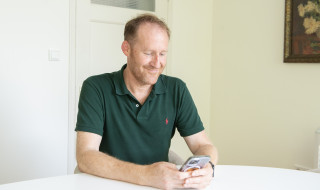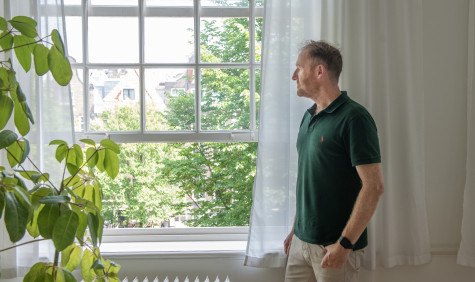Kees Verhoeven on digitisation, democracy and common sense
"We need to swim out of the digital trap"
As a member of parliament for D66, Kees Verhoeven focused on digitalisation. Today, as an independent technology expert, he is committed to a humane society in the digital age. Verhoeven worries about the way digital technology is imposed, without freedom of choice or ethical debate.
On 30 September, Verhoeven will be keynote speaker at SURF's Network & Cloud Event. There, he will not only warn the audience about the latent dangers of unchecked digitisation, but also call for collective action. "We have a serious mission," he says. "For democracy, for education and research, as well as for our children."
Digitalisation as a political issue
After studying economic geography, Verhoeven took part in an exchange program in the US and did volunteer work in Guatemala, where he taught young people. "I mainly tried to teach them basic knowledge so they could increase their chances," he says. He then worked for years as an advocate at MKB-Nederland and eventually as director of MKB-Amsterdam.

Kees Verhoeven
He is particularly concerned about the way digital technology is imposed, without freedom of choice or ethical debate. "You open a programme and boom, AI tools are automatically offered. Nobody asks if you want them. That happens because the technology companies have commercial rather than rule-of-law interests. That weakens our democracy and comes at the expense of our civil rights. These are dangerous developments that worry me."
"Can that still be turned around? "Yes, it always can", Verhoeven replies cheerfully, "but how - that's a painful question. There is no quick and easy way."
"The use of digital technology is not just a matter of education or personal discipline. It is also a systemic and political issue."
Erosion of democracy
Verhoeven outlines a bit of history. "Around 1975, the first personal computers emerged. In the late 1980s, the internet began to take shape. That also heralded the beginning of globalisation, digitisation and liberalisation and initially led to great growth and a lot of optimism."
"But increasingly we became aware that capitalism and meritocracy were beginning to tip over towards the kind of society where everyone is mainly self-centred. With that, we are losing our independence and resilience. Also towards technology, which is precisely very much catering to the ego."
Slowly but surely, this has made us more dependent in ways that we are now unable to let go of. "We have swum into a trap. Voluntarily at first, because of the convenience, the growth, the promises. But now we are in it." In Verhoeven's view, the trap represents erosion of democracy. "We have to turn around and swim back to the entrance," he says.

"Through smart procurement policies and joint requirements, you can organise countervailing power and choose technology that serves society"
Don't be naive, but make active choices
Using digital technology is not just a matter of education or personal discipline. It is also a systemic and political issue. Which trees should we shake to turn the tide? "I see it twofold," says Verhoeven, "we need to shake at the top, in politics and large organisations, so that awareness and counter-power arise there. But also from below, by getting citizens to think about their choices and behaviour and what influences them."
"What if my temporary absence from LinkedIn caused me to miss out on great opportunities? That feeling shows exactly how addicted and dependent we have become."
For instance, he took part in 'May Social Free', in which participants live without social media for a month. "I'm mostly on LinkedIn, so in terms of behaviour it wasn't too bad. But business-wise, I was a bit worried at times. What if I missed out on great opportunities because of my temporary absence? That feeling shows exactly how addicted and dependent we have become."
According to Verhoeven, the way out is not easy, but it is possible. "The history of digital technology shows that we have to keep learning to deal with new forces. That requires education, research and joint decision-making. Not naively believing in the goodness of tech, but actively making choices. And in this, I see a key role for Europe."
Europe as a hopeful route
Opting for European alternatives is not a holy grail, Verhoeven stresses. "European tech can also produce power concentration. But the difference is that within Europe we have democratic control mechanisms." We need to move away from Dutch and European dependence on US and Chinese tech providers and platforms, according to Verhoeven.
"Especially within education and research, SURF can play an important role in this," he argues. "Through smart procurement policies and joint requirements, you can organise counter-power and choose technology that serves us as a society."

"His children are only allowed to have a smartphone starting at the end of grade 8, and just like in any other family, that sometimes leads to conflict"
Healthy in digital times
Verhoeven's insights are not just theoretical or policy-related; they also touch his daily life as a father of four children aged between 4 and 17. "Our children are only allowed to have a smartphone starting at the end of grade 8," he says. "And even then: not at the dinner table and not in the bedroom." As in any family, this sometimes results in struggles. "My children also don't want to miss anything and want to be like their friends," he says.
Yet he believes in the power of parenting as well as good conversations. "It's about understanding what you're doing on that screen. Scrolling on TikTok is different from doing homework in your notes app." He therefore thinks parent initiatives for less screen time, minimum ages for smartphones and stricter school rules are a good thing.
"My four children also don't want to miss anything on their smartphones and want to be like their friends"
In the hustle and bustle of work, parenthood and social activities, Verhoeven tries to stay healthy by staying active. He still plays football weekly - something he’s been doing for forty years - and walks 15,000 steps daily. "Movement is my medicine," he laughs.
Despite all the concerns about the state of democracy, Verhoeven remains hopeful. The road back out of the digital trap is long and requires commitment, he argues, "but we can do it. With education and research, with new standards and political counter-power. We just have to keep swimming against the global current."
Text: Brigitte Bloem
Photos: Vera Duivenvoorden
